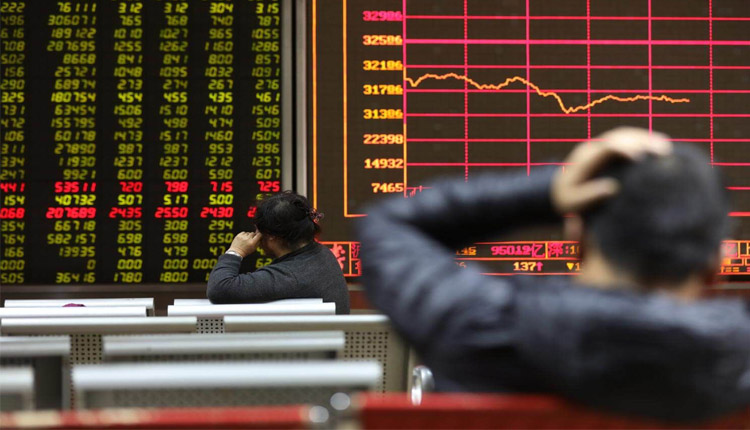Stocks in Asia were broadly lower on Friday, with Japanese equities leading the fall.
The Nikkei 225 fell 1.11 percent on the day as it closed at 20,166.19, while the Topix index declined by 1.91 percent to finish its trading week at 1,488.19. The benchmark Nikkei 225 dropped more than 2.5 percent in the previous trading session.
Shares of Japanese banks fell on the back of the Bank of Japan’s decision on Thursday to keep interest rate targets unchanged. Mitsubishi UFJ Financial Group shed 2.22 percent while Sumitomo Mitsui Financial Group dropped 2.21 percent. Japanese banks have suffered as a result of the central bank’s loose monetary policy, which has had the side effect of impacting the revenues of the country’s lenders.
Over in South Korea, the Kospi recovered from earlier losses to close slightly higher at 2,061.49 — up 0.07 percent.
In Australia, the ASX 200 lost its earlier gains to close 0.69 percent lower at 5,467.6, with most sectors slipping. Shares of the country’s so-called Big Four banks declined, with Australia and New Zealand Banking Group, Westpac and National Australia Bank all seeing declines of at least 1 percent.
Chinese hackers charged
The mainland Chinese markets, closely watched in relation with Beijing’s trade spat with Washington, slipped on the day. The Shanghai composite declined by 0.79 percent to close at around 2,516.25 and the Shenzhen composite lost 0.959 percent to end its trading week at about 1,284.66.
Hong Kong’s Hang Seng index recovered from its earlier losses to trade up by about 0.32 percent, as of its final hour of trade.
On Thursday, the U.S. Justice Department announced charges against two Chinese nationals for being part of a global hacking campaign. The two individuals, Zhu Hua and Zhang Shilong, are charged with conspiring to commit computer intrusions and wire fraud, as well as aggravated identity theft. It was part of campaigns that lasted for years, as they sought to steal from several foreign governments and dozens of companies. The two men remain at large.
Prosecutors also accused the two of operating in conjunction with the Chinese government.
“China will find it difficult to pretend that it is not responsible for this action,” Deputy Attorney General Rod Rosenstein said at a press conference.
“I think it’s important to see these accusations as just the latest, really, in a series of moves by the Trump administration in recent months to frankly, apply more pressure to China across the board,” Michael Fuchs, senior fellow at Center for American Progress, told CNBC’s “Squawk Box” on Friday.
In overnight market action stateside, stocks saw a second day of sharp sell-offs. The Dow Jones Industrial Average dropped 464.06 points to close at 22,859.6 — bringing its two-day declines to more than 800 points and its 5-day losses to more than 1,700 points. The S&P 500 shed 1.58 percent to end the trading day at 2,467.41 while the Nasdaq Composite fell 1.6 percent and closed at 6,528.41 after dipping into bear market territory during the session.
The Cboe Volatility Index — one of the market’s best gauges of marketplace fear — rose above 30.
The Dow and Nasdaq posted their lowest closes since October 2017, while the S&P 500 finished at its lowest level since September 2017.
Stocks fell to the low for the day after U.S. House of Representatives Speaker Paul Ryan announced that President Donald Trump would not sign a temporary government funding resolution. Following the announcement, more political turmoil in the White House ensued when Defense Secretary James Mattis resigned from his post over disagreements with Trump.
The moves Thursday came one day after the Fed decided to hike its benchmark overnight lending rate by one quarter point in the prior session. The Dow fell more than 350 points following the Fed’s decision and pushed the major indexes to new lows for the year.
Oil prices stage partial comeback after Thursday plunge
Amid the slide in the stock markets on Thursday, oil prices plummeted to their lowest levels in more than a year, continuing a sell-off which has been driven by concerns about oversupply.
International benchmark Brent crude futures dropped $2.89, or 5.05 percent, to settle at $54.35 a barrel. U.S. West Texas Intermediate (WTI) crude futures declined by $2.29, or 4.75 percent, to settle at $45.88 a barrel.
Brent hit a session low of $54.28 a barrel, its lowest price since mid-September 2017, while WTI sank to $45.67, its lowest price since late August 2017.
Prices attempted to stage a comeback during the afternoon of Asian trade on Friday, as Brent rose 1.09 percent to $54.94 per barrel and WTI gained 1.09 percent to $46.38 per barrel.
Currencies
The U.S. dollar index, which tracks the greenback against a basket of its peers, was at 96.357 after seeing an earlier high of 96.494.
The Japanese yen, widely viewed as a safe-haven currency, traded at 111.30 after touching lows above 112.5 in the previous session.
The moves in the Japanese currency came after the country’s inflation data for the month of November came in below expectations. The core consumer price index (CPI), which discounts the effect of fresh food costs, rose 0.9 percent year-on-year. That was lower than a median market forecast of a 1.0 percent increase, according to Reuters.
The so-called core-core CPI, which discounts the effect of both fresh food and energy costs, gained 0.3 percent on a year-on-year basis. It had risen around 0.4 percent year-on-year in the previous month.
The Australian dollar was at $0.7113 after a turbulent session yesterday which saw it touching highs above $0.714.
